ARK Disciplinary Policy and Procedure - NASUWT
ARK Disciplinary Policy and Procedure - NASUWT
ARK Disciplinary Policy and Procedure - NASUWT
Create successful ePaper yourself
Turn your PDF publications into a flip-book with our unique Google optimized e-Paper software.
<strong>Disciplinary</strong> <strong>Policy</strong> <strong>and</strong> <strong>Procedure</strong>1. Introduction1.1 <strong>ARK</strong> Academies expects all its employees to recognise their obligations to theirschool, the public, pupils <strong>and</strong> other employees <strong>and</strong> to conduct themselvesproperly at all times <strong>and</strong> in accordance with its Code of Conduct. Appendix 1gives examples of misconduct <strong>and</strong> gross misconduct but these lists are not to betreated as exhaustive.2. Purpose2.1 To achieve high quality <strong>and</strong> efficient education <strong>and</strong> good employee relations thisprocedure aims to:• Improve conduct primarily by advice <strong>and</strong> correction rather than bydisciplinary measures• Provide a fair method of dealing with alleged breaches in st<strong>and</strong>ards ofconduct3. Scope3.1 This procedure applies to all employees (teaching <strong>and</strong> support staff) directlyemployed by <strong>ARK</strong> Academies with more than 26 weeks service (who are notsubject to a probationary period).4. Equal Opportunities4.1 The disciplinary procedure must always be applied fairly <strong>and</strong> in accordance withemployment law <strong>and</strong> <strong>ARK</strong> Academies Equal Opportunities <strong>Policy</strong>.5. Responsibilities5.1 <strong>ARK</strong> Academies is responsible for maintaining fair, consistent <strong>and</strong> objectiveprocedures for matters relating to staff discipline.5.2 The principal has overall responsibility for the internal organisation, control <strong>and</strong>management of each Academy.5.3 The members of the SLT (senior leadership team or designated senior manager)have responsibility for the internal organisation, control <strong>and</strong> management of theirarea of responsibility.6. Timing6.1 <strong>Disciplinary</strong> matters should normally be conducted within the timescales laiddown in the procedure. However, if there is a valid reason to do so, timescales<strong>Policy</strong> Reviewed: May 2009 Page 1 of 13
can be varied. If this is initiated by management, the employee should be givenan explanation <strong>and</strong> informed when a response or meeting can be expected.6.2 All efforts should be made by employees to attend meetings that constitute partof this procedure. When there are valid reasons to reschedule meetings thenthese should be rearranged without undue delay.7. Informal Action7.1 Less serious breaches of conduct (i.e. first occurrences of some types ofmisconduct) can be dealt with informally by counselling the employee (seeAppendix 2 for flow chart of the disciplinary procedure process).7.2 This involves drawing to the employee's attention the unsatisfactory conduct,explaining what conduct is required, <strong>and</strong> setting a clear <strong>and</strong> reasonabletimescale for the employee's conduct/behaviour to improve.7.3 Consideration should be given to any difficulties which an employee may befacing <strong>and</strong> a genuine attempt should be made to help the employee to overcomethem. Where considered appropriate, managers should seek OccupationalHealth advice when managing staff who may be suffering from mental illness oralcohol or substance abuse.7.4 In some cases, it may be beneficial to use external mediators to resolve conflictin the workplace7.5 HR must be consulted prior to the initiation of any formal action.8. <strong>Disciplinary</strong> Sanctions8.1 The following formal stages of disciplinary action can be taken for breaches ofconduct (see Appendix 1).8.2 Warnings are progressive from First to Final except for:• Cases of gross misconduct (which if substantiated through the disciplinaryprocess may result in summary dismissal with no entitlement to statutory notice).• Cases which are less serious than gross misconduct but warrant a Final Warningbeing issued regardless of prior formal warnings.<strong>Disciplinary</strong>ActionAuthority to Issue Duration of Warningon Personal FileFirst written warning Member of SLT/Chair of9 months<strong>Disciplinary</strong> PanelFinal written warning Member of SLT/Chair of12 months<strong>Disciplinary</strong> PanelDismissal Chair of <strong>Disciplinary</strong> Panel -<strong>Policy</strong> Reviewed: May 2009 Page 2 of 13
13. Appeals <strong>Procedure</strong>13.1 Employees have the right of Appeal against all formal disciplinary action.13.2 Appeals must be registered in writing with the principal within ten working daysof the date of the letter confirming the disciplinary decision. Appeals receivedafter this period will not be heard.13.3 Appeals against decisions made by the disciplinary panel must be considered byan appeals panel, which will consist of the principal <strong>and</strong> a representative from<strong>ARK</strong> Academies who have had no prior involvement in the case.13.4 A quorum of the appeals panel will be two.13.5 In submitting an appeal, employees are asking the appeal panel to consider thefairness <strong>and</strong> reasonableness of any disciplinary measures taken at the originalHearing.13.6 Employees/appellants must present any new evidence which was unavailable atthe time of submission of the appeal documentation at least five working daysprior to the Appeal hearing so that management has an opportunity to respond.13.7 Appeals against disciplinary action will be usually be considered by the panel inrelation to one or more of the following grounds:i) The PROCEDURE, – the grounds of appeal should detail how proceduralirregularities prejudiced the disciplinary decision.ii) The FACTS, – the grounds of appeal should detail how the facts do notsupport the decision or were misinterpreted or disregarded. They shouldalso detail any new evidence to be considered.iii) The DECISION, – the grounds of the appeal should state how the act(s)of misconduct did not justify the level of disciplinary action taken or the actwas one of misconduct rather than gross misconduct.13.8 Appeal hearings will be convened as soon as is reasonably practicable <strong>and</strong> theemployee/appellant will be given 10 working days notice of the time <strong>and</strong> placeof the Appeal hearing.13.9 The Appeal will concentrate on the area(s) of dispute only <strong>and</strong> will not be a rerunof the whole disciplinary hearing. Accordingly, it is important that theemployee is explicit about the grounds for appeal <strong>and</strong> must provide clear <strong>and</strong>specific reasons in writing. Such written notice of Appeal must include referenceto any new facts the employee/appellant intends to raise at the Appeal.13.10 The result of the Appeal <strong>and</strong> the reasons for the decision will be conveyed to theappellant immediately after the Hearing <strong>and</strong> will be confirmed in writing to theappellant <strong>and</strong> his/her representative within 5 working days by the Chair of theAppeal Panel.<strong>Policy</strong> Reviewed: May 2009 Page 6 of 13
16.2 If the Child Protection <strong>Procedure</strong> is involved, other disciplinary procedures willbegin only if <strong>and</strong> when the matter has been referred back to the school. The factthat external agencies have not taken action should not be taken as an indicationof the employee’s innocence or guilt.17. Record keeping17.1 Managers <strong>and</strong> Panels must keep written records of meetings <strong>and</strong> discussionsrelating to the disciplinary process. These must be written during or as soon afterthe event as possible to ensure the accuracy of the record. Written records mustbe signed <strong>and</strong> dated by all parties. Copies of all final meeting records must begiven to employees <strong>and</strong> their representatives. Written confirmation of theoutcome of any meetings will be sent to the employee <strong>and</strong> their representativefor their information <strong>and</strong> a copy kept on the employee’s personnel file inaccordance with the Data Protection Act 1998. Records should include:• the nature of the alleged misconduct;• what was decided <strong>and</strong> actions taken;• the reason for the actions;• whether an appeal was lodged;• the outcome of the appeal; <strong>and</strong>• any subsequent developments17.2 Employees may also wish to keep records of events to support their case.18. Special Situations18.1 Grievances raised during the course of the disciplinary procedure18.1.1 Sometimes an employee may raise a grievance during the course of adisciplinary case. Where this happens <strong>and</strong> depending on the circumstances, itmay be appropriate, to suspend the disciplinary procedure for a short period untilthe grievance can be considered. The employee, will however, have to raise thegrievance in accordance with the <strong>ARK</strong> Grievance procedure.18.1.2 Depending on the nature of the grievance, the Academy may need to considerbringing in another manager to continue to hear the disciplinary case.18.2 Discipline of Employee Representatives18.2.1 Any <strong>Disciplinary</strong> action being contemplated in respect of staff representatives ofrecognised trade unions within this procedure should not be instigated withoutnotification in advance to the full-time official or nominee, of the appropriateTrade Union.19. Review<strong>Policy</strong> Reviewed: May 2009 Page 8 of 13
19.1 This policy will be reviewed every two years in consultation with the recognisedtrade unions.<strong>Policy</strong> Reviewed: May 2009Page 9 of 13
Appendix 1 - Examples of Misconduct <strong>and</strong> Gross MisconductGROSS MISCONDUCTThe following are examples of gross misconduct but are not intended to be exhaustive:1 Prolonged unauthorised absence from work (at least 10 working days without contact).2 While purporting to be absent sick, working or engaging in activities, which are likely to beinconsistent with the reason for absence <strong>and</strong>/or which are unlikely to be conducive torecovery.3 Inappropriate conduct towards or contact with pupils.4 Serious acts of insubordination5 Serious breaches of the school’s Financial Regulations or Code of Conduct.6 Theft or misappropriation of, or failure to account for, or falsely claiming entitlement to, theproperty, assets or funds of the school or its employees.7 Fighting or acts of violence at the work place, serious threatening or abusive behaviourtowards, pupils, parents or fellow employees.8 Criminal offences outside work (including fraudulent activities) which may affect theindividual's employment suitability.9 Unauthorised removal <strong>and</strong> use of school property.10 Failure to report or record any serious matter which it is the employee’s contractual duty(either expressed or implied) to report.11 Falsification of documents likely to be of financial benefit to the employee or other personse.g. time sheets, bonus/expense claims, qualifications etc12 Obtaining a job by lies or deception in the course of selection procedures.13 Making false claims under any of the school’s policies <strong>and</strong>/or procedures.14 Discrimination/harassment against a pupil, employee or parent, on the grounds of sex,trans-gender status, sexual orientation, religion or belief, marital status, civil partnershipstatus, age, race, colour, nationality, national origins, ethnic origin or disability.15 Bullying.16 Being incapable of adequately performing duties as a result of the intake of alcohol ordrugs.17 Serious breaches of the school's Health <strong>and</strong> Safety policies or practices18 Serious contravention of the school’s <strong>Policy</strong> on Internet Access.19 Acts or omissions that would expose the Academy or <strong>ARK</strong> Academies to criticism or causereputational damage<strong>Policy</strong> Reviewed: May 2009 Page 10 of 13
MISCONDUCTThe following are examples of misconduct but are not intended to be exhaustive:1 Regular lateness for work2 Regular failure to follow employment rules e.g. reporting absence3 Refusal to obey a reasonable instruction of a manager4 Negligence at work leading to loss, damage or wastage of school or other property5 Improper, disorderly or unacceptable conduct at, in or near the school.6 Wilfully inadequate work performance (poor performance or lack of capability will normallybe the subject of Capability procedure).7 Private trading.8 Betting or gaming.9 Consistently poor st<strong>and</strong>ards of dress or hygiene.<strong>Policy</strong> Reviewed: May 2009 Page 11 of 13
Appendix 3 - <strong>Disciplinary</strong> Hearing Structure (Gross Misconduct)Adviser (s) Chair - Principal <strong>ARK</strong> AcademiesRepresentativeStep 1Chair to ensure that all procedural steps have beenadhered toStep 2Chair to ask the Investigating Officer to present thecase (including questions to witnesses)Step 3Employee or Rep may ask points of clarification fromthe IO or Witness.Step 4Panel Members may ask points of clarification from theIO or witnessesStep 5Employee or Rep will present his / her case (includingquestions to witnesses)Step 6The IO may ask points of clarification from theEmployee /Representative (including witnesses).Step 7Panel Members may ask points of clarification from theEmployee /Representative (including witnesses).Step 8Panel Members may wish to ask further questions ofeither side.Step 9Chair to ask the Investigating Officer to make anyconcluding remarks.Step 10Chair to ask the Employee / Representative to make anyconcluding remarksStep 11Hearing adjourned for the panel to reach a decision <strong>and</strong>confirm the outcome verbally to the employee.Step 12 Chair of the panel to confirm the outcome in writing (with reasons <strong>and</strong> right of appeal within 5 working days to the employee <strong>and</strong> his her representative.<strong>Policy</strong> Reviewed: May 2009 Page 13 of 13


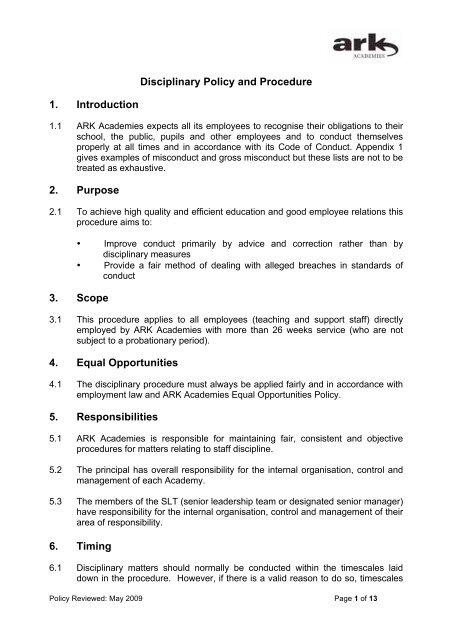
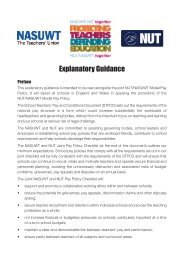
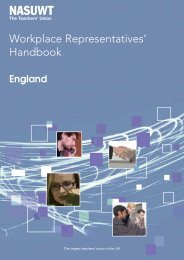

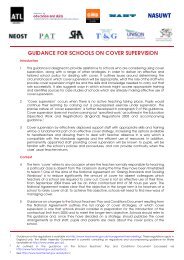
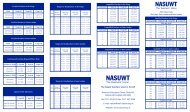
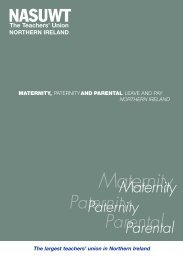

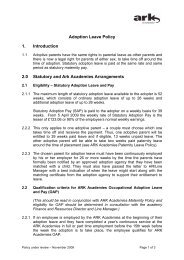
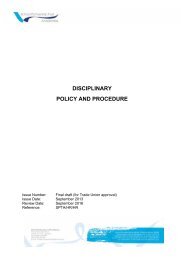
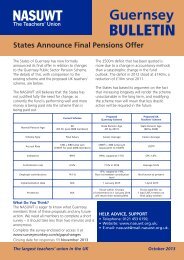
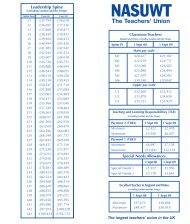

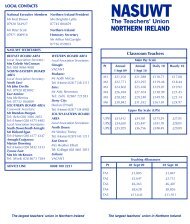
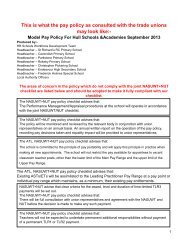
![Salaries (London & Fringe) 2012-2013 [pdf - 281 kb] - NASUWT](https://img.yumpu.com/47816007/1/190x112/salaries-london-fringe-2012-2013-pdf-281-kb-nasuwt.jpg?quality=85)